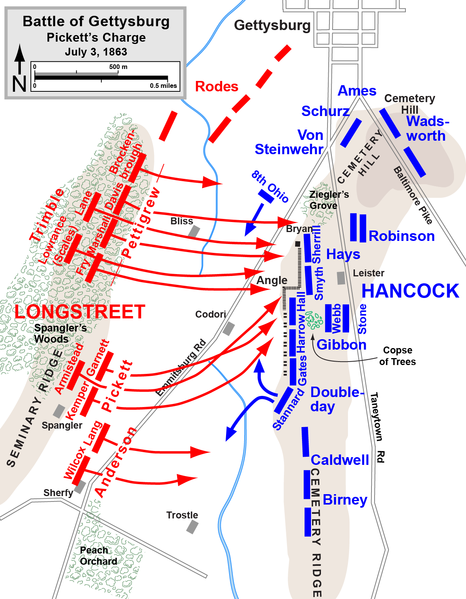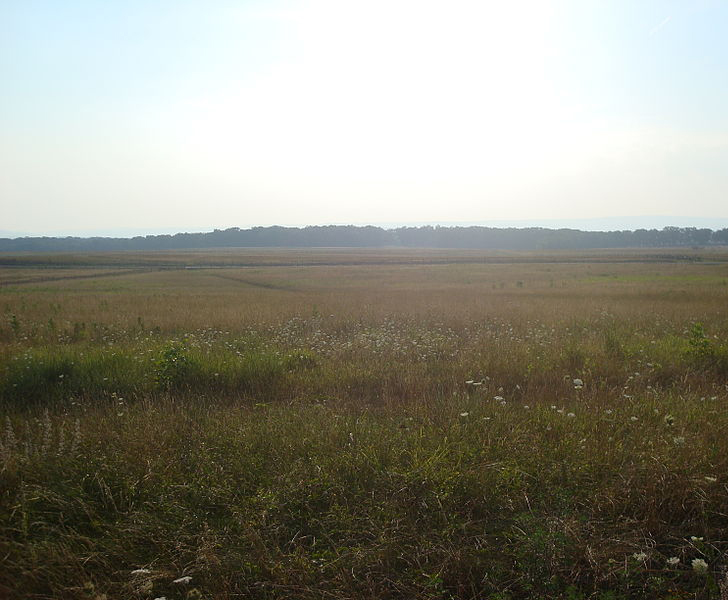It is just after three o’clock in the afternoon on July 3rd, 1863 just outside of the hamlet of Gettysburg, Pennsylvania. You are a member of the the 71st Pennsylvania and note for the first time in over an hour that you can hear yourself think. You have been burrowed like a badger into the ground just behind a low stone fence at the upper crest of an open field, protecting your eardrums and praying for your life as an onslaught of iron shot and killer shrapnel flew over your head, and exploded with deafening blasts behind you. You raise your head guardedly and stare through the smoke across an open field to a row of trees known as Seminary Ridge, and think you see the glint of a thousand sun splashed diamonds. It is deadly quiet, and strangely beautiful, in the searing heat. The beauty is ephemeral as the reality sets in and the diamonds coalesce out of the trees into the mid-day light. You realise the hell you have just lived through holds another painful interlude for you. Your little corner of the fence is about to be the focal point of a nation’s apocalyptic schism, in which one image of nationhood will sustain, and one will fail. You are about to be target of Pickett’s Charge.
On the other side of the open field just within the cover of the trees of Seminary Ridge, you are a member of the proud army of Virginia. In woolen garments in a humidity swollen day near 90 degrees you have sweated in the brutal heat in motionless air for over two hours waiting for your time to cross the open field ahead. You are the forward sword of a direct Virginia line from Lee to Longstreet to Pickett to Armistead to you, the heart of the confederate nation, the home of the great founders like Washington , Madison, and Jefferson, the homeland stage of the great battles of the civil conflict, Virginia. You look across that open field and in the momentary quiet contemplate how anyone could think one could cross that open field and survive. But you are in the Army of Northern Virginia, and pride and honor come before death. If they say you go…you go. You are about to be the living apex of Pickett’s charge.
The mid afternoon sun blazed across the open field on that day in 1863 as the soldier actors on a horrific stage played a heroic part in the climax of the epic three day struggle known as the battle of Gettysburg. General Robert E. Lee, commander of the confederate forces had been in continuous attack mode as was his personality, on the Union Army’s right flank through the town of Gettysburg and against Cemetery Hill, and on its left flank through the Peach Orchard and Little Round Top over the past two days. Now the force of the blow would come to the center,split the Union army, and end the conflict that had already taken so many lives. General Lee knew he had to live in a perfect world, as the Union forces had advantages in numbers of forces, armaments, economic power, and victimhood on its side. He had against such overwhelming considerations, his brave, loyal ,well trained army of winners. Beyond the open field lay the stone fence; beyond the stone fence lay Washington DC and the end of the war. In a perfect world, the flank attack by General Early’s forces on the Union right violently fulminating all morning was to distract and weaken the Union middle. The stunning artillery barrage of Colonel Alexander’s over one hundred fifty cannon proceeding the charge for two hours of ceaseless explosion was to pummel the Union middle, and coordinated with the Pickett onslaught from the front, General Jeb Stuart’s cavalry was to fragment the backbone of the Union from behind with a simultaneous attack from the rear. In a perfect world, the 12000 troops of Longstreet’s army would cross the field, find a shattered and demoralized Union middle and crush now and for all time the Union army capacity and morale, and end the war. In a perfect world, General Lee could see it all, and believed it could be.
Out of the trees seen above into the hot mid day sun, 12000 troops paraded out into the open field to decide the destiny of all who believed in the ideal of freedom, as it was conceived by both sides in their own way.
The perfect world ended with the first step into the sun and reality set in. The battle will never be described better than in Shelby Foote’s “Stars In Their Courses“. Like all epics that culminate around a single moment, the somewhat inappropriately named Pickett’s Charge, has the painful romance that belies its horror as always occurs when an unstoppable force meets an immovable object. The 12000 found instead of an  incapacitated Union artillery and decimated infantry, a largely intact and devastatingly coordinated defensive response. From the left flank came crushing fire from Hay’s Ohio troops collapsing in Pettigrew’s North Carolina brigades, making it no farther than the fences lining Emmitsburg Road. The Virginians wheeling to their left across the open 1000 yards of field toward the stone fence, faced first the exploding artillery shells, then the grape shot of Union cannon like a hail storm blistering 20 men at a time, torturing the survivors as they attempted to re-form their lines. As they crossed the field to first the road and then the stone fence, they came into the full force of infantry rifles and their merciless aim. In the last one hundred yards the march finally became a charge, and briefly in what is known as the “high mark of the confederacy” Armistead’s men managed to scale the wall at the angle and briefly overwhelm the local union troops. In a melee of fists, bayonets, screams, shots, and curses exhausted men fought for their version of free will and the world hung in the balance. But only briefly. Union reinforcements came crashing down on the confederate breech, there were no living southern reinforcements to take advantage, and the breech quickly closed. The lifelong friends Union General Hancock and Confederate General Armistead were wounded, Armistead mortally. The door to Washington so briefly open, closed violently on the survivors, and the southern high mark was no more. Confederate retreat was total and to the taunting, revengeful Union cries of “Fredericksburg, Fredericksburg!” General Lee seeing the retreat washing around him, rode up to Pickett to marshal his division and prepare for a Union counter attack. Pickett was said to reply, ” General Lee, I have no division now.”
incapacitated Union artillery and decimated infantry, a largely intact and devastatingly coordinated defensive response. From the left flank came crushing fire from Hay’s Ohio troops collapsing in Pettigrew’s North Carolina brigades, making it no farther than the fences lining Emmitsburg Road. The Virginians wheeling to their left across the open 1000 yards of field toward the stone fence, faced first the exploding artillery shells, then the grape shot of Union cannon like a hail storm blistering 20 men at a time, torturing the survivors as they attempted to re-form their lines. As they crossed the field to first the road and then the stone fence, they came into the full force of infantry rifles and their merciless aim. In the last one hundred yards the march finally became a charge, and briefly in what is known as the “high mark of the confederacy” Armistead’s men managed to scale the wall at the angle and briefly overwhelm the local union troops. In a melee of fists, bayonets, screams, shots, and curses exhausted men fought for their version of free will and the world hung in the balance. But only briefly. Union reinforcements came crashing down on the confederate breech, there were no living southern reinforcements to take advantage, and the breech quickly closed. The lifelong friends Union General Hancock and Confederate General Armistead were wounded, Armistead mortally. The door to Washington so briefly open, closed violently on the survivors, and the southern high mark was no more. Confederate retreat was total and to the taunting, revengeful Union cries of “Fredericksburg, Fredericksburg!” General Lee seeing the retreat washing around him, rode up to Pickett to marshal his division and prepare for a Union counter attack. Pickett was said to reply, ” General Lee, I have no division now.”
If the words were spoken, they told a harrowing truth. The confederate army of Pickett’s charge sustained over 50% casualties with an estimated 1200 deaths and over 4000 wounded, to the Union’s 1500 estimated casualties. Longstreet’s army lost all 15 of his regimental commanders, including two Brigadier Generals and six Colonels. The horrendous butcher’s bill of the three day battle was over 50,000 casualties to the participating armies. The effect on the south of having lost the battle at Gettysburg, coupled the next day with General Grant’s capture of an entire Confederate Army at Vicksburg ended any hope of the Confederate dream of nationhood. General Lee, who asked for so much more coordination then the technology of the time was capable of giving, recognized what it meant and apologized to the retreating troops, crying out to all who would listen, ” It is all my fault.”
Across that open field in that simmering day in July in 1863, men trusted their destiny to a loving God, who they hoped would understand their violence and forgive them. They gave willingly their families, their dreams, their far away homes, and their lives for conflicting versions of what it means to be free, and what is required to retain that free will. It is not for us so distantly removed to judge their reasoning, but instead to stand back in awe, of the compelling force of a man’s need to determine his own free will, and fulfill his destiny on the altar of a principle. The open field we cross is full of risk and torment, but takes place under the canopy of a forever open sky.

